

Daily Telegraph. To use this website, cookies must be enabled in your browser. To enable cookies, follow the instructions for your browser below. Facebook App: Open links in External Browser There is a specific issue with the Facebook in-app browser intermittently making requests to websites without cookies that had previously been set.
Daily Telegraph. Labor slams NSW government's 'disgraceful' affordable housing target. Labor has launched an attack on the Baird government over the chronic undersupply of affordable housing in Sydney, accusing it of leveraging state-owned land to fill government coffers rather than provide housing for low-income workers.
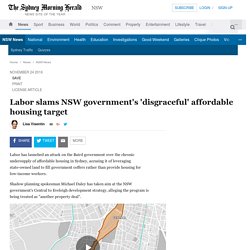
Shadow planning spokesman Michael Daley has taken aim at the NSW government's Central to Eveleigh development strategy, alleging the program is being treated as "another property deal". This is a modal window. This modal can be closed by pressing the Escape key or activating the close button. Captions Settings Dialog Beginning of dialog window. Nocookies.
You have cookies turned off To use this website, cookies must be enabled in your browser. To enable cookies, follow the instructions for your browser below. Facebook App: Open links in External Browser There is a specific issue with the Facebook in-app browser intermittently making requests to websites without cookies that had previously been set. Nocookies. Department of Planning and Environment - Design competition. NSW Industry Leader Warns Against Inclusionary Zoning. In response to media reports which suggest that the Greater Sydney Commission is set to recommend inclusionary zoning policies in a number of draft district plans set to be introduced shortly, Urban Taskforce Australia Chief Executive Officer Chris Johnson has hit out at the mooted plan.
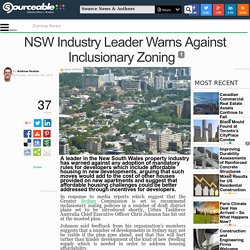
Johnson said feedback from his organisation’s members suggests that a number of developments in Sydney may not be viable if the plan goes ahead, and that this will hurt rather than hinder development of the kind of new dwelling supply which is needed in order to address housing affordability. Instead, he says that 40,000 new affordable homes could be built if developers were instead given an incentive whereby any project which provided 20 percent of units as affordable dwellings were given a bonus of 20 percent extra floor space on the development approval. “This is likely to push the cost of those units up by at least ten percent, so making them even more unaffordable, or the project just won’t proceed.”
Time for Meaningful Reforms for Housing Affordability - PBA. The not-for-profit sector will be lobbying hard to ensure that the rules of any new affordable housing system results in a meaningful reform and not just a grand-sounding but empty gesture, writes Wendy Hayhurst, CEO of the NSW Federation of Housing Associations.
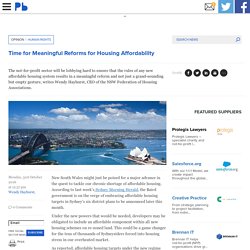
New South Wales might just be poised for a major advance in the quest to tackle our chronic shortage of affordable housing. According to last week’s Sydney Morning Herald, the Baird government is on the verge of embracing affordable housing targets in Sydney’s six district plans to be announced later this month. Under the new powers that would be needed, developers may be obligated to include an affordable component within all new housing schemes on re-zoned land. Revealed: Lucy Turnbull's affordable housing plan for Sydney. Affordable housing will be mandated in new housing developments on rezoned land across Sydney, in a major change to the city's planning laws poised to be introduced by the state government.
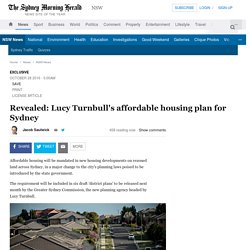
The requirement will be included in six draft 'district plans' to be released next month by the Greater Sydney Commission, the new planning agency headed by Lucy Turnbull. Loaded: 0% Government developer 'hopes like hell' he can build affordable housing in Sydney. The chief executive of government agency UrbanGrowth NSW says he "hopes like hell" he can introduce affordable housing into new development schemes the agency is planning across the city, but an overall policy on the issue is still a year away.
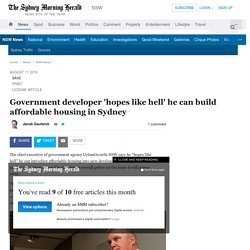
The NSW government has been facing growing calls to introduce new measures to boost the supply of affordable housing. Former premier Nick Greiner has advocated for measures to encourage housing for households on average incomes, while property developers have indicated some support for the idea. But there is no government policy to do so in areas where it has said it wants to build thousands of new homes, such as through Central to Eveleigh in the inner city, around Glebe Island and White Bay in the inner west, or in North Parramatta. Terrace housing to come to Sydney suburbs under NSW government proposal. Loaded: 0% Progress: 0% The watched housing pot is nonetheless bubbling The great funds managers' failure Scott Morrison's 'selective hearing'
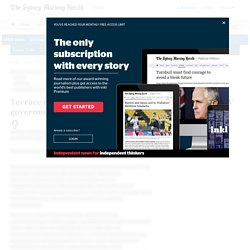
Theconversation. The UN estimates that more than half of the global population currently live in cities, and this figure is expected to balloon to five billion urban inhabitants by 2030.

In both developed and developing countries, the fast pace of urban growth often overwhelms existing housing and infrastructure. This in turn has led to an expansion of informal settlements, expensive rent, the growth of household debt and the consolidation of power and revenue with developers and landlords. With these issues in mind, political leaders, academic experts, civil society organisations and community representatives from UN member states are meeting at the Habitat III conference in Quito, Equador, to develop strategies for managing an urban future, which they will define in the “New Urban Agenda”.
Value capture is not a magic pudding. A recent report by eminent economists Professor Kevin Fox and Dr Nigel Stapledon from the Centre for Applied Economic Research at the UNSW Business School has exposed a myth on the trend sweeping Australian governments at all levels that "value capture" will fund all future infrastructure.
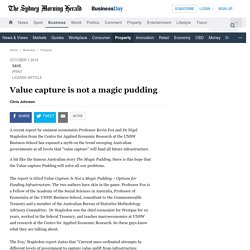
A bit like the famous Australian story The Magic Pudding, there is this hope that the Value-capture Pudding will solve all our problems. The report is titled Value Capture Is Not a Magic Pudding – Options for Funding Infrastructure. The Fox/ Stapledon report states that "Current unco-ordinated attempts by different levels of government to capture value uplift from infrastructure investments are raising the costs of development".
Is Inclusionary Zoning Part of Australia's Housing Affordability Solution? Statistics tell the story.
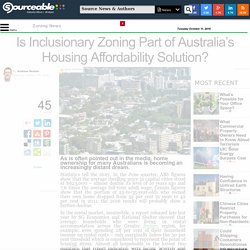
In the June quarter, ABS figures show that the average dwelling price in capital cities stood at $623,000 – almost double its level of 10 years ago and 7.6 times the average full-time adult wage. Census figures show that the portion of 25-to-35-year-olds who owned their own home dropped from 52 per cent in 1996 to 42 per cent in 2011; the 2016 results will probably show a further decline. In the rental market, meanwhile, a report released late last year by SG Economics and National Shelter showed that average households who were living in rental accommodation across the Greater Sydney region, for example, were spending 28 per cent of their household income on rental costs – only marginally below the 30 per cent threshold which is considered to represent the point of housing stress.
Is Inclusionary Zoning Part of Australia's Housing Affordability Solution? Value Capture not a Cure-All for Infrastructure Funding. A bit like the famous Australian story The Magic Pudding, there is this hope that the “Value Capture Pudding” will solve all our problems.

The report by Fox and Stapledon is fittingly titled Value Capture is Not a Magic Pudding – Options for Funding Infrastructure. The authors have skin in the game. Fox is a Fellow of the Academy of the Social Sciences in Australia, professor of Economics at the UNSW Business School, consultant to the Commonwealth Treasury and a member of the Australian Bureau of Statistics Methodology Advisory Committee. Stapledon was the chief economist for Westpac for 10 years, worked in the federal Treasury and now teaches macroeconomics at UNSW and research at the Centre for Applied Economic Research. Unrealistic Great Australian Dream of a quarter-acre block is over for Sydneysiders. The Great Australian Dream of a quarter-acre suburban detached house is ‘unjust’ and needs to be challenged, Planning Minister Rob Stokes said. Due to the scarcity of land and geographical boundaries in Sydney, the Australian dream has unravelled for first-home buyers in 2016, Mr Stokes said at an Urban Development Institute of Australia NSW event on Wednesday.
“In 1975 … Sydney was a homogenous sprawl of terracotta roofs. To buy a house it cost four times the average salary – today, the same home costs at least 12 times the average salary,” he said. While this worked in the 1940s with an abundance of land available, “it’s unjust today as it’s locking too many people out of the market,” he said.